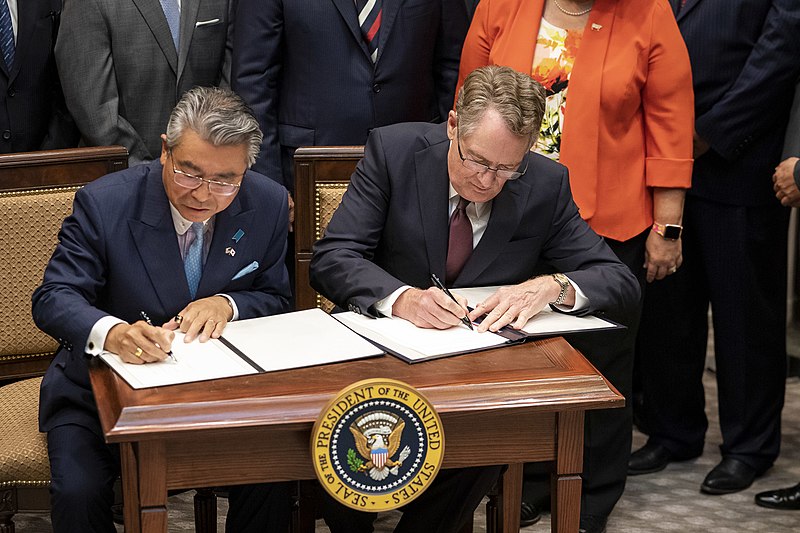Last month, Japan’s defense minister Taro Kono was in the unusual position of having to defend Japanese military action, having sent patrol ships and destroyers to secure merchant shipsin the Middle East. Japan relies on the Middle East for 95% of its oil, approximately 40% of its total energy consumption as of 2017. The vast majority of this oil passes the Strait of Hormuz, a passage several kilometres wide that is particularly vulnerable, bordered by Iran on the north and the United Arab Emirates on the south. Given prior Iranian threats to block off the strait, Japan is looking to secure its interests by aiding Middle Eastern efforts to ensure safe passage for oil, as well as seeking alternative sources of energy. Without large domestic reservoirs of energy (its energy self-efficiency ratio is 7.4%) and coupled with the shutdowns of nuclear power plants following the disaster at Fukushima, Japan is reliant on energy imports. Being the third-largest consumer of oil in the world after the United States and China, diversification from Middle Eastern oil is one of the most pressing security concerns facing Japan today.
Japan’s attempts to diversify its energy sources offer a useful perspective into Sino-Russo-Japanese relations, as well as Russia’s pivot to Asia given its frigid relationship with the West. Quantitative studies for optimal energy diversification suggest that Japan should increase crude oil imports from Russia to lessen its dependency on Middle Eastern imports. With the advent of the Eastern Siberia-Pacific Ocean oil pipeline, Russian oil exports to Japan increased severalfold, and there are reports of major Japanese investment into Russian oil enterprises.
Japanese interests in Russia as a potential source of energy security have also manifested in their foreign policy under Prime Minister Shinzo Abe, from 2012 onwards. Broadly speaking, Japan views Chinese expansion as its main geopolitical threat, particularly in the East China Sea. Maintaining friendly ties with Moscow is thus an attempt to limit the possibility of a united Sino-Russian threat. Japan has demonstrated substantial dedication to better relations with Russia, with the continued existence of diplomatic talks between two even after the annexation of Crimea, against the wishes of America – a key ally. Despite the presence of significant sanctions on Russia from Western countries, Japan maintains bilateral trade with Moscow. Russian exports are also increasingly going eastward as a result of decreased demand from Europe and increased threats of sanctions from the West. In this sense, we can observe two interlinked diversification efforts currently taking place. On the one hand is Russian diversification of trade partners to counter decreased Western demand. On the other is Japanese diversification of energy trade partners that simultaneously serves as a foreign policy strategy to favorably strengthen Russo-Japanese relations.
However, there have been signs of Sino-Russian cooperation in the area, implying that Japanese efforts to further relationships with Moscow via trade have been ineffective. Scholars note that Russo-Japanese trade is dominated by oil on the Russian side and automobiles on the Japanese side. The concentration and overdependence on specific commodities are risky and do not guarantee future development. Sino-Russian relations have strengthened in parallel to Russo-Japanese relations, with American intelligence reports noting that China and Russia have “significantly expanded their cooperation, especially in the energy, military, and technology spheres since 2014.” China’s foreign minister, Wang Yi has publicly noted that China and Russia should cooperate in the face of an “unstable international situation,” and that the bilateral ties “are at their best in history.” Partially, this can be attributed to the ongoing trade and security-based tensions between the United States, Russia, and China, leading to a strengthening of the Sino-Russian relationship as a means of bolstering both economies. Plans are in place to double the trade between Russia and China by 2024, where both countries would be less vulnerable to American trade sanctions and tariffs.
Japanese diversification of energy has manifested in closer trade relations with Russia, which also serves to improve diplomatic ties to prevent a joint Sino-Russo incursion. However, the basis of this trade is limited to specific commodities, which is not a strong foundation for increased diplomatic ties. There are international ramifications if Japan continues to push for more amicable relations with Moscow. How effective will economic sanctions be if there exists robust Russian trade with China and Japan? Given that Sino-Russian ties act as a bulwark against American interests in the area, and the historical ties of Japan as a close American ally, questions arise regarding this aspect of Japan’s foreign policy. The Trump administration has damaged the historically strong Japan-United States relationship, with the American withdrawal from the TPP and accusations of free-riding allies in Europe and Asia. To what degree can Japan remain a proxy for American power in the region if it is actively pursuing closer ties with Moscow? As national economies are becoming increasingly strained and countries are looking for alternative avenues for growth, the shifting blocs of interests in the region have created a rather fluid international order that needs to be taken into account when we consider traditional alliances, such as the one between Japan and the United States.
Photo: “President Trump at the Signing of the U.S – Japan Trade Agreement and U.S. – Japan Digital Trade Agreement” by The White House via Flickr
Disclaimer: Any views or opinions expressed in articles are solely those of the authors and do not necessarily represent the views of the NATO Association of Canada.




